#Sikh Political Prisoners
Explore tagged Tumblr posts
Text
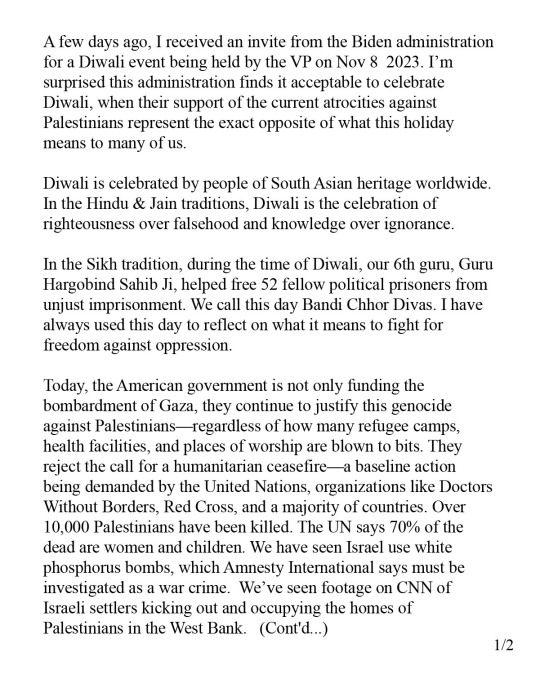
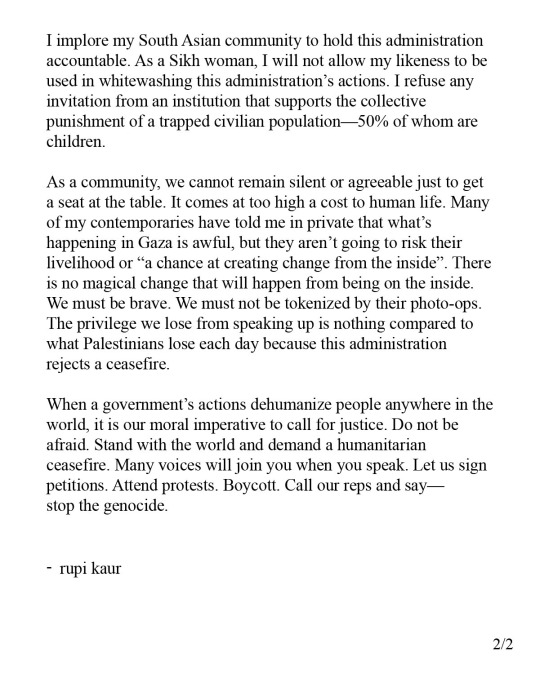
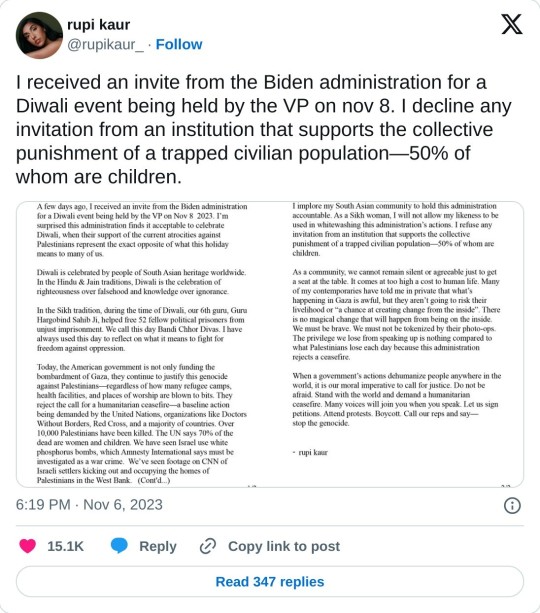
transcript:
A few days ago, I received an invite from the Biden administration for a Diwali event being held by the VP on Nov 8 2023. I'm surprised this administration finds it acceptable to celebrate Diwali, when their support of the current atrocities against Palestinians represent the exact opposite of what this holiday means to many of us.
Diwali is celebrated by people of South Asian heritage worldwide. In the Hindu & Jain traditions, Diwali is the celebration of righteousness over falsehood and knowledge over ignorance.
In the Sikh tradition, during the time of Diwali, our 6th guru, Guru Hargobind Sahib Ji, helped free 52 fellow political prisoners from unjust imprisonment. We call this day Bandi Chhor Divas. I have always used this day to reflect on what it means to fight for freedom against oppression.
Today, the American government is not only funding the bombardment of Gaza, they continue to justify this genocide against Palestinians-regardless of how many refugee camps, health facilities, and places of worship are blown to bits. They reject the call for a humanitarian ceasefire- a baseline action being demanded by the United Nations, organizations like Doctors Without Borders, Red Cross, and a majority of countries. Over 10,000 Palestinians have been killed. The UN says 70% of the dead are women and children. We have seen Israel use white phosphorus bombs, which Amnesty International says must be investigated as a war crime. We've seen footage on CNN of Israeli settlers kicking out and occupying the homes of Palestinians in the West Bank. (Cont'd...)
I implore my South Asian community to hold this administration accountable. As a Sikh woman, I will not allow my likeness to be used in whitewashing this administration's actions. I refuse any invitation from an institution that supports the collective punishment of a trapped civilian population-50% of whom are children.
As a community, we cannot remain silent or agreeable just to get a seat at the table. It comes at too high a cost to human life. Many of my contemporaries have told me in private that what's happening in Gaza is awful, but they aren't going to risk their livelihood or "a chance at creating change from the inside". There is no magical change that will happen from being on the inside. We must be brave. We must not be tokenized by their photo-ops. The privilege we lose from speaking up is nothing compared to what Palestinians lose each day because this administration rejects a ceasefire.
When a government's actions dehumanize people anywhere in the world, it is our moral imperative to call for justice. Do not be afraid. Stand with the world and demand a humanitarian ceasefire. Many voices will join you when you speak. Let us sign petitions. Attend protests. Boycott. Call our reps and say- stop the genocide.
- rupi kaur
60 notes
·
View notes
Text
Reposting since they turned off reblogs
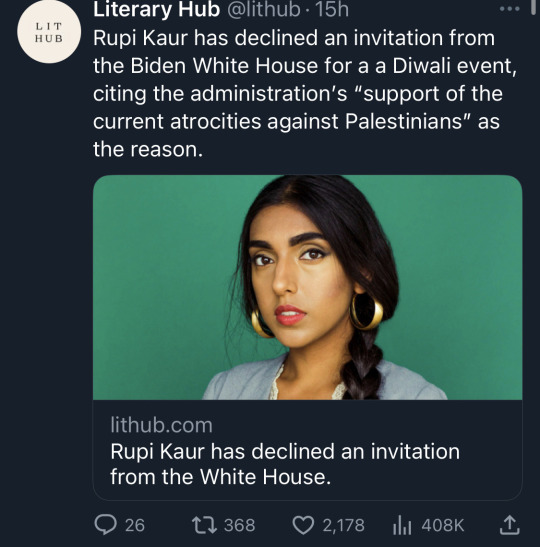
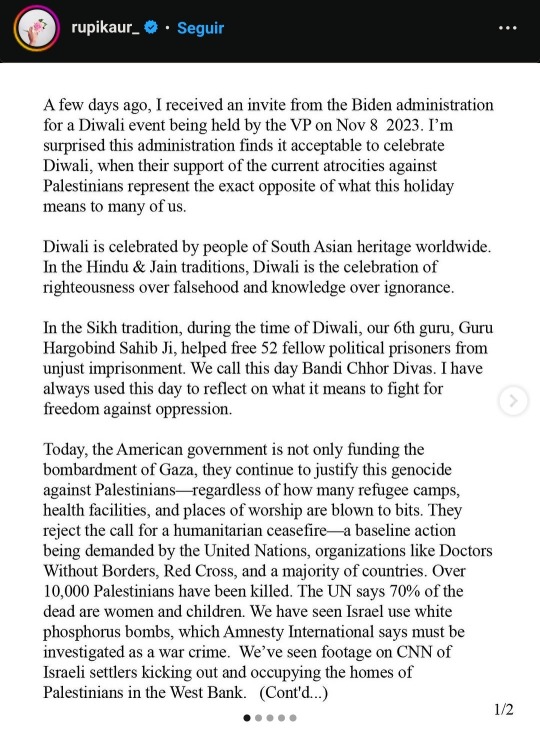
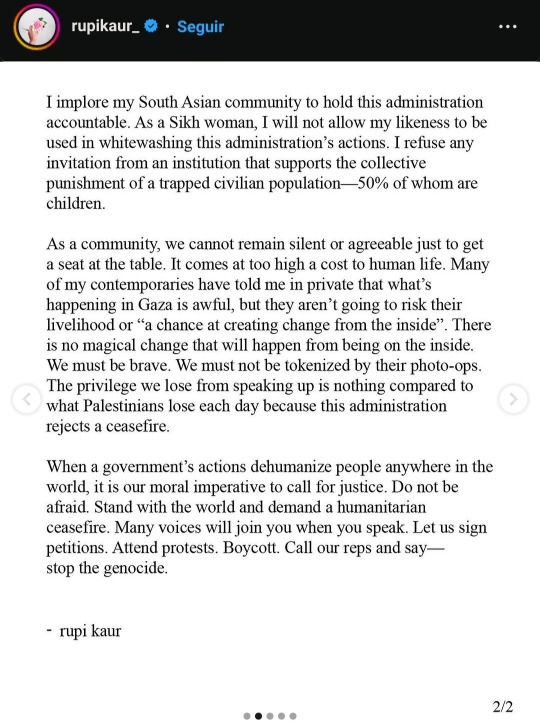
[ID: the first image is a tweet by Literary Hub (@/lithub), reading, "Rupi Kaur has declined an invitation from the Biden White House for a Diwali event, citing the administration's "support of the current atrocities against Palestinians" as the reason." Linked in the tweet is the lithub article, with the title "Rupi Kaur has declined an invitation from the White House" and a photo of Rupi Kaur.
The next two images are from her Instagram, showing a statement. It reads: "A few days ago, I received an invite from the Biden administration for a Diwali event being held by the VP on Nov 8 2023. I'm surprised this administration finds it acceptable to celebrate Diwali, when their support of the current atrocities against Palestinians represent the exact opposite of what this holiday means to many of us. Diwali is celebrated by people of South Asian heritage worldwide. In the Hindu & Jain traditions, Diwali is the celebration of righteousness over falsehood and knowledge over ignorance. In the Sikh tradition, during the time of Diwali, our 6th guru, Guru Hargobind Sahib Ji, helped free 52 fellow political prisoners from unjust imprisonment. We call this day Bandi Chhor Divas. I have always used this day to reflect on what it means to fight for freedom against oppression. Today, the American government is not only funding the bombardment of Gaza, they continue to justify this genocide against Palestinians—regardless of how many refugee camps, health facilities, and places of worship are blown to bits. They reject the call for a humanitarian ceasefire—a baseline action being demanded by the United Nations, organizations like Doctors Without Borders, Red Cross, and a majority of countries. Over 10,000 Palestinians have been killed. The UN says 70% of the dead are women and children. We have seen Israel use white phosphorus bombs, which Amnesty International says must be investigated as a war crime. We've seen footage on CNN of Israeli settlers kicking out and occupying the homes of Palestinians in the West Bank. I implore my South Asian community to hold this administration accountable. As a Sikh woman, I will not allow my likeness to be used in whitewashing this administration's actions. I refuse any invitation from an institution that supports the collective punishment of a trapped civilian population-50% of whom are children. As a community, we cannot remain silent or agreeable just to get a seat at the table. It comes at too high a cost to human life. Many of my contemporaries have told me in private that what's happening in Gaza is awful, but they aren't going to risk their livelihood or "a chance at creating change from the inside". There is no magical change that will happen from being on the inside. We must be brave. We must not be tokenized by their photo-ops. The privilege we lose from speaking up is nothing compared to what Palestinians lose each day because this administration rejects a ceasefire. When a government's actions dehumanize people anywhere in the world, it is our moral imperative to call for justice. Do not be afraid. Stand with the world and demand a humanitarian ceasefire. Many voices will join you when you speak. Let us sign petitions. Attend protests. Boycott. Call our reps and say—stop the genocide." End ID.]
21 notes
·
View notes
Text
It is a deeply held belief of mine that no matter how hateful, awful, or terrible someone says, so long as it does not act as a threat against someone, or act in purpose solely to slander their name or character, that the freedom of speech of the people should be upheld.
I believe that the United Kingdom, in silencing their people, even though the things being said are not necessarily good, or necessary, or kind, are acting as a fascist government. As even under the guise of fairness and a general leftist agenda, they are forcing their citizens into silence and submission to their policies, rather than accepting any dissent.
Sexual assault on women in the UK is on the rise, stabbings are on the rise, and while only accounting for approximately 4% of the population of the UK, they make up about 15% of the jailed population.
And people are being jailed for tweets, and protesting the situation.
The world is trying to silence any dissent now, by framing it as being politically correct. If we let this stand, then when we need to speak out? We won’t be able to.
What happens when people want to protest war, or rations, or talk about the horrible state of the world?
Just look at what KOSA is, and what you’d face for dissent.
Jail?
1) https://www.theguardian.com/society/article/2024/aug/14/violence-against-women-on-uk-trains-rises-by-50-in-two-years#:~:text=The%20number%20of%20crimes%20against,commissioned%20by%20British%20Transport%20Police.
2) https://www.aljazeera.com/amp/news/2024/8/1/southport-attack-why-are-knife-crimes-on-the-rise-in-the-uk
3) https://www.firstpost.com/world/at-4-per-cent-of-uks-population-muslims-make-up-18-per-cent-of-criminals-in-jail-11281491.html/amp
4) https://www.reddit.com/r/AO3/comments/1aug5qi/kosa_is_back_and_threatening_mass_internet/
2 notes
·
View notes
Text
As a member of the Punjabi Sikh diaspora, this is huge news. The BJP, a party that has consistently acted in ways that betray its assertion that it is not anti-Sikh, got no seats in Punjab, a majority-Sikh state.
Additionally, Punjabi voters voted in a political prisoner as a member of the Lok Sabha, which is a really big deal. Amritpal Singh was detained under the National Security Act for advocating for the Khalistani separatist movement. Being charged under the NSA, whether the charges are real or fake, is a method the Indian government uses to shut down dissent through linking it to a banned ideology.
Right now, it’s the 40th anniversary of Operation Bluestar, in which the Indian military killed civilians on pilgrimage to the Golden Temple. This led Indira Gandhi’s Sikh bodyguards to assassinate her and resulted in the 1984 anti-Sikh genocide. The 1984 genocide has still not been officially recognized as a genocide by any nation, despite meeting the criteria; there has been no justice for its victims.
There have also been Sikh political prisoners in jail for over 30 years. An internet shutdown was used during the manhunt for Amritpal Singh. (Internet blackouts a tool that India also uses in Kashmir.) The BJP’s agricultural policies were met with mass protests that resulted in policy brutality against peaceful farmers.
All of this has impacted how Punjab votes, and it means that they’ve voted against the BJP and for candidates who have campaigned on the solutions to their issues, and that means no more Hindu nationalist support.
Voting matters. Voting is how Punjabis, and especially Punjabi Sikhs, were able to make their voices heard this election. Their Lok Sabha members may not be able to do much to fix the issues in Punjab caused by the national government, but at least there is hope that they’ll be able to prevent it from getting worse.
take a moment to read indian election news!! india has voted against the ruling fascist party. while they will resume government they will need to forge alliances and have lost multiple strong members of parliament. and all this despite them controlling the media and jailing their opposers! this is SUCH an important reminder that u shld never ever underestimate the power of a vote
#i once got sent pro-bjp propaganda because i said i don’t support the internet blackouts in kashmir#but as a member of the punjabi sikh diaspora how could i not condemn it?#anyhow THIS ELECTION IS A HUGE DEAL#india#politics#punjab
11K notes
·
View notes
Text
Events 4.13 (before 1950)
1111 – Henry V is crowned Holy Roman Emperor. 1204 – Constantinople falls to the Crusaders of the Fourth Crusade, temporarily ending the Byzantine Empire. 1455 – Thirteen Years' War: the beginning of the Battle for Kneiphof. 1612 – Samurai Miyamoto Musashi defeats Sasaki Kojirō in a duel at Funajima island. 1613 – Samuel Argall, having captured Pocahontas in Passapatanzy, Virginia, sets off with her to Jamestown with the intention of exchanging her for English prisoners held by her father. 1699 – The Sikh religion is formalised as the Khalsa – the brotherhood of Warrior-Saints – by Guru Gobind Singh in northern India, in accordance with the Nanakshahi calendar. 1742 – George Frideric Handel's oratorio Messiah makes its world premiere in Dublin, Ireland. 1777 – American Revolutionary War: American forces are ambushed and defeated in the Battle of Bound Brook, New Jersey. 1829 – The Roman Catholic Relief Act 1829 gives Roman Catholics in the United Kingdom the right to vote and to sit in Parliament. 1849 – Lajos Kossuth presents the Hungarian Declaration of Independence in a closed session of the National Assembly. 1861 – American Civil War: Union forces surrender Fort Sumter to Confederate forces. 1865 – American Civil War: Raleigh, North Carolina is occupied by Union forces. 1870 – The New York City Metropolitan Museum of Art is founded. 1873 – The Colfax massacre: More than 60 to 150 black men are murdered in Colfax, Louisiana, while surrendering to a mob of former Confederate soldiers and members of the Ku Klux Klan. 1909 – The 31 March Incident leads to the overthrow of Sultan Abdul Hamid II. 1919 – Jallianwala Bagh massacre: British Indian Army troops led by Brigadier-General Reginald Dyer kill approximately 379–1,000 unarmed demonstrators including men and women in Amritsar, India; and approximately 1,500 injured. 1928 – The Bremen, a German Junkers W 33 type aircraft, reaches Greenly Island, Canada, completing the first successful transatlantic aeroplane flight from east to west. 1941 – A pact of neutrality between the USSR and Japan is signed. 1943 – World War II: The discovery of mass graves of Polish prisoners of war killed by Soviet forces in the Katyń Forest Massacre is announced, causing a diplomatic rift between the Polish government-in-exile in London and the Soviet Union, which denies responsibility. 1943 – The Jefferson Memorial is dedicated in Washington, D.C., on the 200th anniversary of President Thomas Jefferson's birth. 1945 – World War II: German troops kill more than 1,000 political and military prisoners in Gardelegen, Germany. 1945 – World War II: Soviet and Bulgarian forces capture Vienna. 1948 – In an ambush, 78 Jewish doctors, nurses and medical students from Hadassah Hospital, and a British soldier, are massacred by Arabs in Sheikh Jarrah. This event came to be known as the Hadassah medical convoy massacre.
0 notes
Text
Exclusive Talk with Bhai Lal Singh Akalgarh – SikhSiyasat.Com – Sikh Audios; Videos and Multimedia
Sikh Political Prisoner Bhai Lal Singh Akalgarh spent 28 years behind the bars in India. Arrested in 1992, Bhai Lal Singh was sentenced to imprisonment for life by a TADA Court in 1997. In India persons sentenced to imprisonment for life are released after spending 10 to 14 years in jail but Bhai Lal Singh was made to spend 28 years behind the bars. He was permanently released from jail in August…
0 notes
Text
Clergy in My Life
Anton Sziandor Lavey: Black Mass of nuptials, guaranteeing father a healthy life; final dose of Prolixin, MI-6 chemical (children of Elizabeth, Diana, Kate, and Megan), delivered with "tap spice"; adroxnyl, lake root LSD (bucelaphus incongrexus, stem of feces from squirrel).
Barack Obama: Grand Pastor of Black Mass of the South, holding child in arms at Black Mass.
Father Jim: DC Comics author, and retired CIA; out of IRA Ireland, evacuating after death of ExSec wife, to OSS Hopkinton; Boston Metrowest, start of the Marathon, the Republican Zone; Spanish Pan. Baptism of Catholic Metrowest.
Steven Charlebois: Godfather, "chasing girl in California, AA"; veteran of Cambodia Iron Triangle, drafted as Green Beret; sole justification of conflict, to remove Richard Nixon for gross incompetency.
Alexandra Gaetano: High Priestess of Wiccan South, the Gaetano-Italian ticket; Capone Mob, investigation into bathroom multiplicity starting aneurysm ambushes in "golden throne"; Canadian operations, to infiltrate CIA; responsible for third degree burns from scalding water, by Danahy family; turtle wax on boiling pot, from father.
Roberta Edwards: Founder of MTV and script and casting of video, "Video Killed the Radio Star". Godmother, NSA engineer and civil accountant, irregular police and informant housing, Massachusetts. Brothel, brokers, and hostel access, cleared with bend on right thumb; Elois Lodge Numeral Number, Hitler (Madison Canada).
Vishrki Sanya Gupta: Internist MI-6, "Peter Parker"; friend of mothers of David, Matthew, and Joshua; Charlebois "nil", Matthew "morph", and Joshua "null". Circumcision, with testicles balance from hymonephrenum genome, of Sikh Lata; Dawood Ibrahim.
Father Michael: Retired MI-6 service representative, black bowler hat and handlebar mustache; psychic genome, basis of "Dr. No" James Bond.
Ron Riley: Son of Patty Hearst and Symbionese Liberation Army infiltration CIA officer; responsible for death of Bob Marley, stolen shoe while asleep on Jamaican beach; "too many hits". St. Marks, responsible for installation of Boudica's amplet, inside left arm, two days old; Congregationalist Infiltration Hexadecimal officer of child rearing; shot own father in Angola, Jamaican Constabulary Force; narcotics, defense attorney; no plea. Sworn revenge against DC Comics, after Tommy Lee Jones played him, not Billy Dee Williams.
Rabbi Anatole Steintfeldt: Combat fatality, age 4; alleged Rabbi, Gangster, and INTERPOL, out of Montreal Mafia Jewish-German community; revealed as East German Stasi, by monks and priests beating him to death, on orders of Memere Charlebois, Georgette Charlebois nee Racicot, Ma Bell; real name, Georgette Skorzene, Mussolinist agent, poisoner of HP Lovecraft with car varnish wax.
Rabbi Hiram Ezekiel: Hasty Pudding Club, severance of base of shaft, not circumcision, to reattach and create a pornography actor; Jewish-Mormon orders, Persian-Quds; orders, George Romney; own father placed in incarceration, by Mitt Romney, cementing a political career in Massachusetts.
Father Bernard Law: Import from Israel, stolen child of the Montgomeries of Britain; sent own battalion, to prison, to punish the Jews, for rejecting justice and Dave Mustaine, at the end of Rabbi Hiram Ezekial; hyperactive convulsive disorder, induced in child; only aided to end, by "Burden"; film made for Bobby "B-Rock" Wolfinackis, at being stripped of the Klan; Jewish-Christianity, Rasta, returned to Hebrew-Judaism, Babylonian Knighthood.
Patroness Diane Charlebois: Dominatrix fetish rendered impossible, by personal schooling; treating the dominatrix, as a submissive, for mutual orgasm; posture as dead boyfriend if an abused woman, through admission in tanct and tantamont as pederast; the removal from vice as slave, and return to the life of an escort; a high powered woman, at any rate.
Vicar Matthew Lennox: Recruited at mass psychotic break of NSA, at having served John McCain's interests, on M3; own survival guaranteed, by prior servitude, at "thought exercise"; Aurora movie shooting, caused to beg forgiveness from campus military drill instructors; registered as "Charles Manson", on campus HUMINT military roster; given plane to Westminster Abbey, in London, as Scottish Knight; forever a slave, the Earl of Swine, a proper Lennox. Same last name, and blood, as King Charles Lennox III.
Imam Sayed Adnan: Fellow CIA agent, and constant stalker, for "more leads"; orders, Jessica Bailey, elite Japanese hitwoman, out of Nepal; blood of Dalai, through Franklin Pierce; attempting to resurrect her fated bloodline, Ernst Rohm, protection of honesty and patriotism, of Germany; before the death of the Stormtroopers, the Night of Long Knives; her own guaranteed. Gil Valentin, the Baronet of African Belgium.
0 notes
Text
HUMAN RIGHTS VIOLATIONS IN SO-CALLED ISLAMIC REPUBLIC OF PAKISTAN,
WHICH BY DEFINITION IS NEITHER DEMOCRATIC NOR ISLAMIC
UNFORTUNATELY
40 U SCIRF | ANNUAL REPORT 2024 USCIRF–RECOMMENDED FOR COUNTRIES OF PARTICULAR CONCERN (CPC) PAKISTAN
■ Redesignate Pakistan as a “country of particular concern,” or CPC, for engaging in systematic, ongoing, and egregious violations of religious freedom, as defined by the International Religious Freedom Act (IRFA), and lift the waiver releasing the administration from taking otherwise legislatively mandated action as a result of the designation; ■ Impose targeted sanctions on Pakistani government agencies and officials responsible for severe violations of religious freedom by freezing those individuals’ assets and/or barring their entry into the United States under human rights-related financial and visa authorities, citing specific religious freedom violations; and ■ Enter into a binding agreement, under Section 405(c) of IRFA, with the Pakistani government to encourage substantial steps to address religious freedom violations with benchmarks, including but not limited to: ■ Release blasphemy prisoners and other individuals imprisoned for their religion or beliefs; ■ Repeal blasphemy and anti-Ahmadiyya laws; until such repeal, enact reforms to make blasphemy a bailable offense, require evidence by accusers, ensure proper investigation by senior police officials, allow authorities to dismiss unfounded accusations, and enforce existing penal code articles criminalizing perjury and false accusations; ■ Remove requirements for self-identification of religion on identity documents; and ■ Hold accountable individuals who incite or participate in vigilante violence, targeted killings, forced conversions, and other religiously based crimes. The U.S. Congress should: ■ Incorporate religious freedom concerns into its larger oversight of the U.S.-Pakistan bilateral relationship through hearings, letters, and congressional delegations and advocate for the release of religious prisoners of conscience in Pakistan. I n 2023, religious freedom conditions in Pakistan continued to deteriorate. Religious minorities were targeted for their beliefs, including accusations of blasphemy, and were subject to mob violence, lynchings, and forced conversions. Attacks on and desecration of places of worship also occurred frequently throughout the year. While the government made some positive reforms, including approving a new curriculum making Islamic studies noncompulsory for religious minorities, proposed amendments to Pakistan’s blasphemy law risk further escalating persecution against Hindus, Christians, Sikhs, and Shi’a and Ahmadiyya Muslims. Blasphemy cases and associated mob violence remained a substantial threat to religious freedom. In the runup to national elections, political parties leveraged blasphemy laws for political gain. In January 2023, the National Assembly, the lower house of parliament, unanimously passed an amendment to strengthen punishment under the country’s blasphemy law. In February, at least 50 men stormed a police station in Punjab to kidnap and lynch a Muslim man, Muhammad Waris, accused of desecrating the Qur’an. In August, a mob of hundreds attacked the Christian community of Jaranwala, Pakistan, damaging dozens of churches and homes following accusations of blasphemy. In September, a month of protests and clashes began in Gilgit-Baltistan after a Shi’a cleric was accused of making blasphemous statements. Terrorist attacks targeting religious minorities and places of worship significantly increased in 2023. In January, a suicide bomber attacked a mosque in Peshawar, killing at least 100, the country’s most deadly terrorist attack in recent years.
0 notes
Text
Shaheed Diwas: Remembering the Martyrs of India’s Freedom Struggle

Show your respect to India’s freedom fighters on this special day with AdBanao App. Read the special blog about Shaheed Bhagat Singh, Sukhdev, and Rajguru Ji.
Shaheed Diwas: Remembering the Martyrs of India’s Freedom Struggle
On 23rd March every year, India observes Shaheed Diwas, or Martyrs’ Day to pay homage to the three young revolutionaries who sacrificed their lives for the cause of India’s independence.
Bhagat Singh, Sukhdev Thapar, and Shivaram Rajguru were hanged to death by the British government on this day in 1931, after being convicted for the assassination of a British police officer in Lahore.
Their courage, patriotism, and sacrifice inspired millions of Indians to join the freedom movement and fight against the oppressive colonial rule.
Brief Story of Bhagat Singh, Sukhdev, and Rajguru.
Bhagat Singh was born on 28th September 1907 in a Sikh family in Punjab. He was influenced by his family’s involvement in the Gadar movement and the revolutionary activities of Kartar Singh Sarabha and Rash Behari Bose.
He joined the Naujawan Bharat Sabha, a youth organization founded by Lala Lajpat Rai, and later became a member of the Hindustan Socialist Republican Association (HSRA), a radical group that aimed to overthrow British rule through armed struggle.
Sukhdev Thapar was born on 15th May 1907 in Ludhiana, Punjab. He was also a student of the National College in Lahore, where he met Bhagat Singh and Yashpal.
He was an active member of the Naujawan Bharat Sabha and the HSRA and was involved in various revolutionary activities such as distributing pamphlets, organizing meetings, and collecting funds.
Shivaram Rajguru was born on 24th August 1908 in Khed, Maharashtra. He was a devout Hindu and a follower of the Arya Samaj.
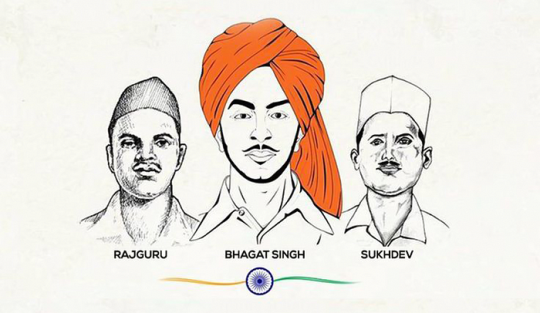
The trio became famous for their daring attack on the British police officer John Saunders on 17th December 1928, in retaliation for the death of Lala Lajpat Rai, who was injured in a lathi charge ordered by another officer, James Scott. Bhagat Singh and Rajguru shot Saunders dead, while Sukhdev and Chandra Shekhar Azad provided cover. They then escaped from the scene and went into hiding.
On 8th April 1929, Bhagat Singh and another HSRA member, Batukeshwar Dutt, threw two bombs and leaflets inside the Central Legislative Assembly in Delhi, to protest against the repressive laws enacted by the British. They did not intend to harm anyone, but to make the deaf hear. They surrendered after the bombing and were arrested along with other HSRA members.
The trial of the Lahore Conspiracy Case, as it came to be known, lasted for two years. During this period, Bhagat Singh, Sukhdev, and Rajguru, along with other prisoners, went on a hunger strike to demand better treatment and equal rights for Indian political prisoners. They also used the court as a platform to propagate their revolutionary ideology and expose the injustice of British rule.

Download special Shaheed Diwas Posters, videos, trending reels, free statuses, audio jingles, WhatsApp stickers, and much more.
Read the full blog here.
#india#indianfreedom#bhagat singh#sukhdev#adbanao#digitalmarketing#adbanaoapp#postermaker#social media advertising#gandhi#freedom#indian#poster
0 notes
Text

Amritsar, November 5, 2023: As per media reports, ‘Waris Punjab De’ President Amritpal Singh’s parents and kin of those detained in Assam’s Dibrugarh Jail under the NSA (National Security Act), performed ‘areas’ at Akal Takht today seeking the release of the ‘Bandi Singhs’ (Sikh political prisoners) and eradication of drugs in Punjab.
0 notes
Text
Monday, September 25, 2023
Fears grow that overseas targeted killing by states is on the rise (Washington Post) The allegation that India was involved in the assassination of a Canadian citizen and Sikh activist on Canadian soil moves the world’s most populous nation onto a dubious list of countries suspected of carrying out targeted killings beyond their borders. If confirmed, India would join Russia, Saudi Arabia, Iran and other countries credibly accused of plotting lethal attacks overseas against perceived adversaries, including their own citizens, in recent years, according to Western security officials and experts. Those states are among an even broader group including China that are widely suspected of employing their security services to engage in surveillance operations, intimidation campaigns and even abductions on other countries’ territory. The United States’ muted response so far to Canada’s allegations against India reflect Washington’s conflicted position on the issue, having launched its own unilateral strikes on terrorist leaders and been widely perceived as taking a harder line against alleged abuses of adversaries such as Russia than countries including India and Israel, which are considered allies. In a measure of the perceived proliferation of such extrajudicial and extraterritorial operations, international organizations and human rights groups have adopted a term—“transnational repression”—to capture its various forms as well as the intent of governments involved.
Prospect of government shutdown poses a new threat to U.S. economy (Washington Post) The looming federal shutdown poses a new threat to American households, whose budgets are already facing pressure from higher gas prices, imminent student loan payments and depleting pandemic savings. Although any of those shocks on their own wouldn’t be enough to sink the economy, economists say a pileup of disruptions—including the ongoing autoworkers’ strike, rising borrowing costs and a drop-off in child-care funding—is likely to strain family budgets at a time when things are already slowing. Economists now expect growth to dip considerably in last three months of the year, as a confluence of challenges chip away at household and business spending.
One Day on the Border: 8,900 Migrants Arrested, and More on the Way (NYT) They come from Brazil, Burkina Faso, Uzbekistan, India and dozens of other countries, a moving global village of hundreds of thousands of people crossing the Rio Grande and slipping through gaps in the border wall at a pace of nearly 9,000 people a day, one of the highest rates of unlawful crossings in months. Despite new border barriers and thickets of razor wire, risk of deportation and pleas for patience, a resurgent tide of men, women and children is not waiting. Driven by desperation, families and individuals are pushing across the southern border and past new efforts by the Biden administration to keep migrants waiting until they secure hard-to-get appointments to enter the nation with permission. The influx is creating a humanitarian and political crisis that stretches from packed migrant processing facilities in border states to major American cities struggling to house and educate the new families. Though many get through, thousands are being sent back across the border or on flights to their home countries. But from Texas to California, more than two dozen migrants who have entered illegally in recent days said they could not afford to wait. “If you don’t take risks, you cannot win,” said Daniel Soto, 35, who crossed with his mother on Tuesday after they sold their car, restaurant and house in Lima, Peru, betting their entire fortune of $25,000 on a weeklong journey to the border near Tijuana.
Venezuela regaining prison control after seizing Tocoron jail (Reuters) Venezuela has completed the first phase of regaining control of its prison system, Interior Minister Remigio Ceballos said on Saturday, speaking at the Aragua jail near Tocoron, just days after security forces seized the prison that was infamously run by prisoners. The jail had restaurants, bars and even outdoor swimming pools, among other luxuries, and it was the operating center for feared criminal gang Tren de Aragua, according to Venezuela’s government. The jail housed 1,600 inmates, Ceballos said, adding that most have already been relocated to other prisons across the country.
Western officials press Ukraine to hold elections despite war (Washington Post) Despite Russia’s war in Ukraine and a nationwide state of martial law, some Western politicians are pushing the government in Kyiv to hold parliamentary and presidential elections—a prospect that has left many Ukrainian officials scratching their heads. The proposal—initially floated by Tiny Cox, the Dutch head of the Council of Europe’s Parliamentary Assembly—was also pressed by Sen. Lindsey O. Graham (R-S.C.), during a visit to Kyiv last month with Senators Richard Blumenthal (D-Conn.) and Elizabeth Warren (D-Mass.), which otherwise focused on solidifying U.S. assistance and bipartisan support for Ukraine. Holding free and fair elections in wartime is virtually impossible and also ill-advised, according to Ukrainian officials, election experts and democracy advocates. Roughly one-fifth of Ukraine’s territory is now occupied by Russian forces. Millions of Ukrainians are displaced and many are living outside the country. Tens of thousands of soldiers are deployed to the front. The pressure to hold elections, despite such obstacles, highlights the constant demand by some in the West that Ukraine prove its commitment to democracy. Ukrainian officials say that in order to hold a major vote during wartime, considerable financial, logistical and legal hurdles must be overcome. In private, some say that the prospect is outright impossible.
Budget Drones Prove Their Value in a Billion-Dollar War (NYT) They are made of plastic or plastic foam, weigh only a few pounds and are often launched simply by having a soldier throw them into the air, as if tossing a javelin. In a slow-moving counteroffensive against Russian forces that has been reliant at times on the smallest advantages, a fleet of cheap, mostly off-the-shelf drones is providing one for the Ukrainians. The drones have begun to make a difference in one corner of a stagnant war, soldiers, commanders and pilots said in interviews, because their different materials and variable frequencies can evade enemy jamming systems. That has allowed them to venture farther in searches for enemy artillery positions and multimillion-dollar air defense systems, all while risking aircraft worth only a few thousand dollars apiece. Along one of their two main Ukrainian lines of advance in the south, they say, the Russian Army has been forced to move its howitzers out of range of Ukraine’s guns, as drone pilots have adapted well enough to regularly evade Russian electronic jamming systems that had been spotting them reliably earlier in the war. Drones made of plastic foam or plastic are harder to find on radar, reconnaissance teams said. Ukraine buys them from commercial suppliers who also sell to aerial photographers or hobbyists around the world, along with parts such as radios, cameras, antennas and motors. The drone units mix and match parts until they find combinations that can fly past sophisticated Russian air defenses.
Fears and Chaos Grow in Nagorno-Karabakh After Takeover (NYT) Along the serpentine highway linking Armenia with Nagorno-Karabakh, a breakaway Armenian enclave, Norik Grigoryan strained to catch a glimpse of his village just a few miles away. His wife and son are stuck there, he said, after Azerbaijan reclaimed the region this week in a swift military operation. But the passage was blocked, and communications were intermittent at best. Two days after the Azerbaijani military brushed aside Russian peacekeepers and routed a vastly outgunned group of fighters defending the Armenians in the enclave, concerns mounted about the tens of thousands of Armenians who were now stranded there under their new Azerbaijani rulers. Artak Beglaryan, a former high-ranking official in the pro-Armenian government, described a dire humanitarian situation, with different parts of the region cut off from one another and the Azerbaijani military blockading internal roads. Electricity supply has been erratic, he said, making it impossible for many residents to charge their phones, and people have been spotted cooking on open fires. “Another urgent problem is hunger; there is a serious shortage of food,” he said, adding that thousands of people had been displaced and relocated in various communities and Russian peacekeepers’ bases. Russia has acknowledged taking thousands of people into its bases. In the absence of hard information, rumors abounded among the Armenian population. The Azerbaijani government has tried to calm the fears, promising to recognize the rights, security and freedom of Armenians in the region.
Syrians feel growing pressure from Turkey's anti-migrant political wave (Reuters) Anti-migrant sentiment, economic woes and political pressures are leading some of the 3.3 millions Syrians living in Turkey to plan a return to Syria or seek shelter in Europe, according to migrants interviewed by Reuters. They are concerned that rhetoric against migrants may rear up in campaigning for March local elections, echoing efforts to tap into nationalist sentiments during May's general elections. Many of those now living in Istanbul face a more immediate worry: authorities' Sept. 24 deadline for them to leave the city if they are registered in other Turkish provinces. One 32-year-old Syrian said he is saving up to pay smugglers and plans to go to Belgium. Hardship caused by Turkey's rampant inflation and anti-migrant rhetoric motivated his decision. "We are blamed and scapegoated for the worsening economy. Discrimination is rising. It is becoming impossible for us to live here," he told Reuters, declining to give his name for security reasons.
Blasting Bullhorns and Water Cannons, Chinese Ships Wall Off the Sea (NYT) The Chinese military base on Mischief Reef, off the Philippine island of Palawan, loomed in front of our boat, obvious even in the predawn dark. Radar domes, used for military surveillance, floated like nimbus clouds. Lights pointed to a runway made for fighter jets, backed by warehouses perfect for surface-to-air missiles. More than 900 miles from the Chinese mainland, in an area of the South China Sea that an international tribunal has unequivocally determined does not belong to China, cellphones pinged with a message: “Welcome to China.” The world’s most brazen maritime militarization is gaining muscle in waters through which one-third of global ocean trade passes. Here, on underwater reefs that are known as the Dangerous Ground, the Chinese People’s Liberation Army, or P.L.A., has fortified an archipelago of forward operating bases that have branded these waters as China’s despite having no international legal grounding. China’s coast guard, navy and a fleet of fishing trawlers harnessed into a militia are confronting other vessels, civilian and military alike. The mounting Chinese military presence in waters that were long dominated by the U.S. fleet is sharpening the possibility of a showdown between superpowers at a moment when relations between them have greatly worsened. And as Beijing challenges a Western-driven security order that stood for nearly eight decades, regional countries are increasingly questioning the strength of the American commitment to the Pacific. While the United States makes no territorial claims to the South China Sea, it maintains defense pacts with Asian partners, including the Philippines, that could compel American soldiers to these waters. Just as anxiety over nearby Taiwan has focused attention on the deteriorating relations between Washington and Beijing, the South China Sea provides yet another stage for a contest in which neither side wants to betray weakness.
How China’s ‘broke ghosts’ are keeping up appearances during straitened times (Washington Post) The waitress set a pot of boiling broth in the middle of the table and arranged the small dishes of snacks that come free with any meal here at Haidilao, one of China’s best-known hot pot restaurant chains. It was just before midnight. “I can bring you a blanket and a pillow,” she said, “but you’ll have to be out at 7 a.m.” This offer—to sleep in a booth and get a night’s rest in central Shanghai for the price of dinner—is one that scores of young people have recently taken her up on, the waitress said. All manner of partygoers and late-night diners were gathered around plumes of chili-laced steam on a recent night, the restaurant the hottest spot in a shopping mall that was otherwise closed. Many of them would be catching some shut-eye under the Haidilao’s greasy tables, and freshening up with the free mouthwash and hair spray in its well-stocked bathroom. It’s not an obvious place to refresh for another day in China’s capital of culture and fashion. But crashing in the restaurant allows people, whether from the suburbs or out of town, to stay in the city for cheap. Calling themselves “broke ghosts” and “ruthless money-saving fiends,” they’re part of a generation of young people in China who are trying to stretch their dollars amid China’s economic slowdown, the first of their lives. They endured the country’s cutthroat education system with the promise that their future wages would buy them a lifestyle better than their parents and grandparents. They’ve graduated to find that, as China’s economic woes pile up, their futures are much less certain.
0 notes
Text
Events 10.31 (after 1950)
1956 – Suez Crisis: The United Kingdom and France begin bombing Egypt to force the reopening of the Suez Canal. 1956 – Hungarian Revolution of 1956: A Revolutionary Headquarters is established in Hungary. Following Imre Nagy's announcement of October 30, banned non-Communist political parties are reformed, and the MDP is replaced by the MSZMP. József Mindszenty is released from prison. The Soviet Politburo makes the decision to crush the Revolution. 1961 – In the Soviet Union, Joseph Stalin's body is removed from Lenin's Mausoleum, also known as the Lenin Tomb. 1963 – Indiana State Fairgrounds Coliseum gas explosion: A gas explosion at the Indiana State Fairgrounds Coliseum in Indianapolis kills 81 people and injures another 400 during an ice show. 1968 – Vietnam War October surprise: Citing progress with the Paris peace talks, US President Lyndon B. Johnson announces to the nation that he has ordered a complete cessation of "all air, naval, and artillery bombardment of North Vietnam" effective November 1. 1973 – Mountjoy Prison helicopter escape. Three Provisional Irish Republican Army members escape from Mountjoy Prison, Dublin aboard a hijacked helicopter that landed in the exercise yard. 1979 – Western Airlines Flight 2605 crashes on landing in Mexico City, killing 73 people. 1984 – Indian Prime Minister Indira Gandhi is assassinated by two Sikh security guards. Riots break out in New Delhi and other cities and around 3,000 Sikhs are killed. 1994 – American Eagle Flight 4184 crashes near Roselawn, Indiana killing all 68 people on board. 1996 – TAM Transportes Aéreos Regionais Flight 402 crashes in São Paulo, Brazil, killing 99 people. 1998 – Iraq disarmament crisis begins: Iraq announces it would no longer cooperate with United Nations weapons inspectors. 1999 – Yachtsman Jesse Martin returns to Melbourne after 11 months of circumnavigating the world, solo, non-stop and unassisted. 1999 – EgyptAir Flight 990 crashes into the Atlantic Ocean near Nantucket, killing all 217 people on board. 2000 – Soyuz TM-31 launches, carrying the first resident crew to the International Space Station. The ISS has been crewed continuously since then. 2000 – Singapore Airlines Flight 006 crashes on takeoff from Taipei, killing 83. 2002 – A federal grand jury in Houston, Texas indicts former Enron chief financial officer Andrew Fastow on 78 counts of wire fraud, money laundering, conspiracy and obstruction of justice related to the collapse of his ex-employer. 2003 – Mahathir Mohamad resigns as Prime Minister of Malaysia and is replaced by Deputy Prime Minister Abdullah Ahmad Badawi, marking an end to Mahathir's 22 years in power. 2011 – The global population of humans reaches seven billion. This day is now recognized by the United Nations as the Day of Seven Billion. 2014 – During a test flight, the VSS Enterprise, a Virgin Galactic experimental spaceflight test vehicle, suffers a catastrophic in-flight breakup and crashes in the Mojave Desert, California. 2015 – Metrojet Flight 9268 is bombed over the northern Sinai Peninsula, killing all 224 people on board. 2017 – A truck drives into a crowd in Lower Manhattan, New York City, killing eight people. 2020 – Berlin Brandenburg Airport opens its doors after nearly 10 years of delays due to construction issues and project corruption.
0 notes
Text






4 notes
·
View notes
Text

0 notes
Text

“Many years ago,” began a story in a Singapore-based newspaper in 1899, “it used to be customary to transport convicts from India to this Colony.” That article profiled a courthouse scene of fisticuffs between two old men. According to the newspaper, these two ex-convicts opted “to settle their slight differences” with violence, resulting in the “junior” of the pair having ���both his arms broken.” [...] Amused by the scene, the writer cast these men as relics from another time.
Convicts from South Asia were once a conspicuous presence in Southeast Asia, their handiwork visible everywhere, particularly in the built environment of Singapore.
In the twenty-first century, public acknowledgment of their achievements barely exists, elided by many in the Indian community who would rather not trace their origins to convict ancestors and erased by postcolonial governments that would rather not see their shining cities and states shaped by coerced labor. As for the roads, bridges, and buildings constructed by “servants” of the East India Company, as Indian convicts understood themselves, many have been leveled to make room for new monuments.
Convicts had a significant role in forging empires across the world. Penal transportation was a key strategy of British imperial rule, notably in the case of Australia, from the eighteenth century onward. However, the British also established penal settlements in Southeast Asia where they sent women and men from South Asia convicted of heinous crimes, including political offenses. [...]
Empire of Convicts: Indian Penal Labor in Colonial Southeast Asia tells the stories of convicts journeying across kala pani (black waters) and making their homes in Bengkulu, Penang, and Singapore, where they served extended sentences.
Despite finding themselves in novel and precarious situations, many prisoners exercised considerable agency and resisted colonial authorities, in some cases even becoming “their own warders.” Such are the tales of Fateh Khan of Banaras who emerged as the sahib and leader of the Indian convicts and soldiers in Bengkulu or Jallia who escaped from Penang and made his way back home to Gujarat or the many women and men who labored in Singapore for decades and never returned to India.
Political prisoners from South Asia lived alongside other convicts in the insular prisons of Southeast Asia. My book’s cover features the belongings of the Sikh rebel, Bhai Maharaj Singh, who fought the British in India and was held captive in Singapore in the early 1850s. These objects -- a conch shell, a finger ring, a knife, two steel quoits, a sewing needle and thread, and a religious text -- attest to persons and things dispersed across an Indian Ocean world. Empire of Convicts serves as a counterpart to well-known stories of law, crime, punishment, and prisons, and to an ongoing story of prisoners, particularly in the United States, being used for their labor and exploited by racist structures in liberal democracies.
---
All text above by: Anand A. Yang. “Forgotten Histories of Indian Convicts in Colonial Southeast Asia.” UC Press Blog (published by University of California Press). 22 January 2021. [Some paragraph breaks added by me. Image shows a portion of the cover of Yang’s book.]
105 notes
·
View notes
Text
It was in the early 20th century that Punjabis studying in the universities of Oxford, Cambridge, London and California began to interact with Western thought. The poet Puran Singh (1881-1931) engaged Nietzsche in Punjabi; the great lexicographer Kahan Singh (1861-1938) collaborated with Macauliffe (1837-1913) on the English translation of the Sikh scriptures for his 6-volume magnum opus The Sikh Religion; the Greek and Sanskrit scholar Dharam Anant [Singh] worked on Plato while Santokh Singh (1892-1927) introduced Marx to Punjab.
Bhai Santokh Singh, a Ghadar activist and one of the founders of the communist movement in Punjab, was tried with 29 other Ghadarites in the Indo-German or San Francisco Hindu Conspiracy Case and sentenced to 21 months rigorous imprisonment. In the McNeil’s Island prison, he came in contact with other political inmates, many of them Russian communist exiles, and began to read leftist books, including the three volumes of Capital. After his release, he travelled to the Soviet Union, where he enrolled in the KUTV – University of the Toilers of the East. After returning to Punjab, he started Kirti (The Worker) in 1926, a Punjabi magazine.
In its first issue, dated February 1926, he published a short introductory article on Dialectical and Historical Materialism. The essay was also an important milestone in the development of Punjabi literary and political prose. Prior to this, historical and political texts – even the traditional medicine formulae – were written in poetry. Given the lack of an established Punjabi tradition of economic and philosophical discourse, Santokh Singh relied on Sanskrit for introducing new philosophical terms into Punjabi.
Dwarka Das Library, which shifted from Lahore to Delhi to Chandigarh after Partition, has in its collection the first English edition of Capital (1887). It is a fair conjecture that Bhagat Singh would have accessed it. In his memoir, Yash ki Dharohar (Heritage of Honour, 1988), Bhagwan Das Mahaur, an accomplice of Bhagat Singh, writes that he had read Capital on the suggestion of Bhagat Singh, but could not comprehend it. Bhagat Singh’s Jail Notebooks include quotes from the writings of Marx and Engels.
Makhan Singh (1913-1973) a whole-timer of the CPI during 1939-1947, spent his time in translating some parts of Marx’s Das Kapital into Punjabi in the Gurmukhi script. In 1942, Jagjit Singh Anand, an editor of Jang-e-Azadi, the CPI organ, received Makhan Singh’s Punjabi translation of ‘Dialectical Materialism’, a chapter in Das Kapital. In his memoir, Anand recalled his deep impression of Makhan Singh’s nuanced grasp of Marxist theory as well as his mastery of the Punjabi language. The two men worked on the editorial board of Jang-e-Azadi until 1947, when Makhan Singh left Punjab for Kenya.
The editorial board of Jang-e-Azadi consisted of communist activists and pioneer Punjabi translators of Marxian literature, including Bhag Singh, a PhD in political science from Berkeley University, Teja Singh Sutantar, a legendary political leader and graduate of the University of the Toilers of the East Moscow, Sohan Singh Josh, Makhan Singh, Jagjit Singh Anand, and Randhir Singh.
In May 1937 a collection of articles on capitalism, imperialism and socialism published in Kirti was compiled by Harkishan Singh Surjeet. This 100-page book was titled ‘Purani te Navi Duniya’ (Old & the New World) by Sathi (Comrade) Karl Marx. It was the first Marxian text in Punjabi that was laden with the new terminology of economics and philosophy, not familiar to most Punjabi readers at the time. Most of the newly-coined terms stuck. But a hundred years later, there is still no consensus about certain words and concepts. For instance, the word ‘Capital’ can be translated both as ‘Poonji’ (origin Sanskrit) and ‘Sarmaya’ (origin Persian).
The first authentic Punjabi translation of Capital was published in 1975 by Navyug publishers, Delhi. The three volumes were translated by a team of fulltime employees of the Soviet Embassy’s Information Department. No other book by Marx except The Poverty of Philosophy was translated into Punjabi.
The Communist Manifesto by Marx and Engels was first translated into Punjabi in the Gurmukhi script by Randhir Singh and published in Lahore in 1946. It took over 70 years for its Punjabi version to appear in the Farsi script in Lahore translated by Mushtaq Soofi (Sanjh publications, 2022). A booklet about contemporary Marxism, titled Nirvar (The Analysis) was published by Rashid Uz Zaman in the Farsi script in Lahore in 1970. Unlike the East Punjabi translation, which largely relies on Sanskrit, Zaman’s translation borrows heavily from Arabic and Farsi. This duality of one language with two scripts and two dictions has been a serious bone of contention between academics, linguists and writers on both sides of the divided land of Punjab.
2 notes
·
View notes